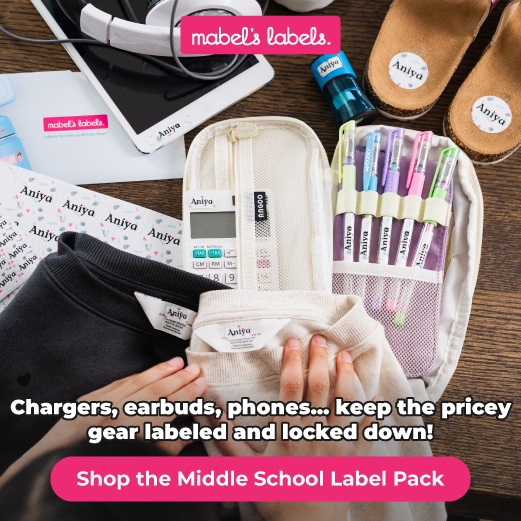“Mom, I think I have a boyfriend.”
Those seven words stopped me mid-sip of my morning coffee; I almost did a spit-take.
My 9-year-old daughter had just casually dropped the bomb between bites of oatmeal, like it was no big deal. And to her, it probably wasn’t. But inside my head? Full. On. Panic.
Talking to kids about crushes….What do I say? Do I act chill? Is this normal? Is she too young? Should I text the teacher? Am I overthinking this?
Spoiler alert: I was overthinking it. But I’ve learned a lot since that breakfast moment—and if you’re a fellow parent of a tween, this one’s for you. Here is what I’ve learned since my spit-take moment:
What’s Actually Going On? It’s Not Dating, It’s Imitating
Before we panic and imagine high school drama playing out on the playground, let’s take a deep breath.
For most tweens, “dating” is largely symbolic. They’re mimicking what they see in older kids, on TV, or even at home. Having a boyfriend or girlfriend at this age rarely means emotional intimacy or physical interaction—it’s more about social currency.
In fact, a 9-year-old’s relationship might mean:
-
Sitting together at lunch
-
Passing notes or texts (if allowed phones)
-
Playing together more often
-
Bragging rights with friends
It’s a feeling—not a relationship in the way adults understand it. For my daughter, it looked more like standing in line together each morning (that’s it, no need to panic.)
Why Crushes Start Around This Age
There are a few reasons romantic feelings tend to bubble up in the tween years:
1. Increased social awareness
Kids in grades 3 to 6 are becoming more aware of social dynamics, popularity, and peer approval. Saying they have a boyfriend or girlfriend can feel like a “cool” badge.
2. Media influence
Even kids who aren’t allowed to watch rom-coms or teen dramas are picking up on the relationships they see in animated shows, and even age-appropriate Disney movies and shows still dabble in romance.
3. Early hormonal shifts
While puberty tends to ramp up around age 10 and beyond, subtle hormonal changes can begin earlier, influencing emotions and curiosity.
What to Say When Your Kid Talks About a Crush:
Firstly, Don’t Make It Weird (Especially When It Isn’t)
One of the biggest things I learned, well before her cruch arrived: Don’t assume it’s a crush just because it’s a friendship between a boy and a girl. My daughter had a great friend who was a boy, and the minute an adult jokingly said, “Ooooh is he your boyfriend?”—you could see the energy change. It’s awkward, it’s embarrassing, and honestly, it sort of derailed what was a sweet, supportive friendship.
If they haven’t said it’s a crush, don’t label it one! Kids deserve friendships that aren’t immediately romanticized or sexualized by grown-ups who should know better. Let them have the space to define it themselves—or not define it at all.
However, if they’ve labeled it themselves….
Start casual and curious
“Tell me more!” is often your best response. Resist the urge to laugh, tease, or react too strongly.
-
“What do you like about them?”
-
“What does having a boyfriend/girlfriend mean to you?”
-
“What kinds of things do you do together?” (This is the angle I took)
Keep it developmentally appropriate
This isn’t the time for “the talk” about sex (unless they’re asking). Most kids just want a little guidance and validation. You can normalize their feelings without turning it into a Big Deal.
When to Step In
While most childhood crushes are harmless, there are moments when you should check in more seriously.
-
Is there pressure from peers to be in a relationship?
-
Is your child acting out of character—anxious, secretive, or withdrawn?
-
Are there signs of teasing, bullying, or exclusion related to crushes?
-
Is anything happening online or via messaging that feels inappropriate?
If any of these ring true, it might be time for a deeper conversation—or to involve a teacher or school counselor. (Luckily, this wasn’t the case for me)

Setting Gentle Boundaries Without Shaming
If your child starts throwing around big labels or requesting “alone time” with a crush, it’s okay to set limits—but do so with empathy. Try:
-
“You’re still growing up and learning about relationships. Let’s keep things simple for now.”
-
“You can have feelings, but let’s talk about what respectful behavior looks like.”
Remember: boundaries should support their growth, not punish their curiosity!
Normalize Feelings—and Keep the Door Open to Talk
The best gift you can give your child is the confidence to talk to you about their feelings—even the squirmy, awkward, fluttery ones. Let them know:
-
Crushes are normal, but if all your friends have a crush, it’s also normal not to have one.
-
Feelings can come and go.
-
It’s okay to like someone of any gender.
-
You’ll always be a safe place to land.
If they’re not opening up? Share your own stories of puppy love and early crushes. A little vulnerability goes a long way.
The most important thing I learned about my daughter’s crush:
Childhood crushes aren’t about lifelong commitment or drama. They’re a first dip into emotional waters—a practice round for bigger feelings to come. By staying calm, curious, and connected, you’re helping your kid build skills in communication, self-awareness, and empathy.
After calling a friend, and fellow mom, she kept me calm and this one line changed how I saw it:
“They’re Not Falling in Love—They’re Learning About It”
So no, my 8-year-old isn’t really “dating.” She’s exploring what it feels like to care about someone. To get butterflies. To giggle with her friends and maybe blush when he walks by.
It’s all part of growing up. And I’m learning how to grow right alongside her—one crush at a time. And that’s something to feel pretty heart-eyes about 🥰

